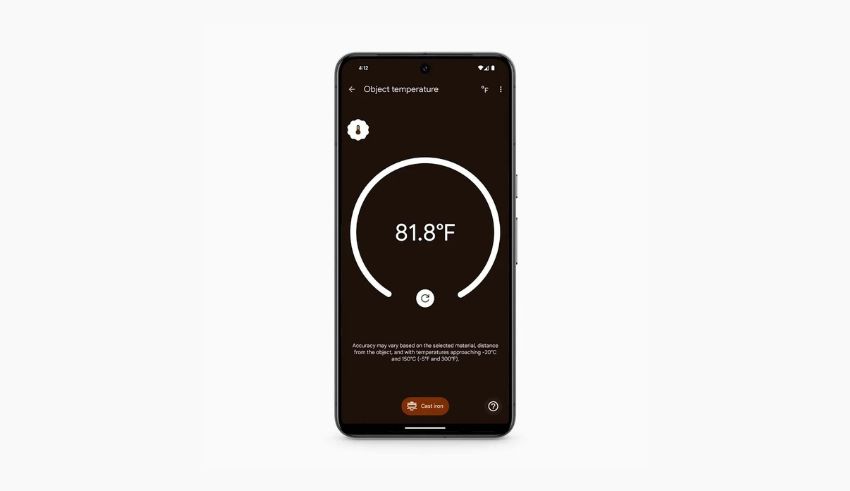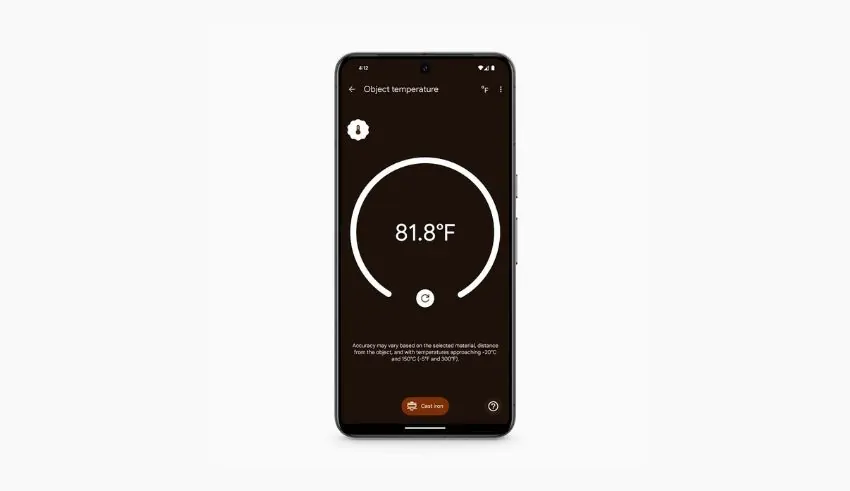

(C) Google Store
Among the most amazing ideas are Google’s Pixel series, which keeps stretching the limits of what a smartphone can do, and a body temperature tracking feature. Originally unveiled with the Pixel 8 Pro, this potential has been gradually revealed in a few European nations, thereby demonstrating a notable progress in the integration of health technology into our daily tools. Although the Pixel phones are not legally offered on the Philippine market, their development begs serious issues about the direction of smartphones and their use in personal health management.
A Transformational Enhancement to Smartphone Possibilities
Google’s January 2024 Pixel Feature Drop among a saturated market of cellphones distinguishes the body temperature tracking capability with one unique ability: Unlike other health-related features included into phones over the years, this one makes constant assessments of body and item temperatures using a specialized temperature sensor. Particularly in view of the COVID-19 outbreak, this capacity is extremely important in a society growing consciousness of health problems.
Already a fundamental need of our daily existence, the convenience of being able to track body temperature with a gadget adds still another level. Imagine being able to rapidly check the temperature of an object without using separate equipment or check the temperature of a loved one using your phone during a late-night worried about a possible fever. Here there is a basic use for parents, caretakers, even individuals with chronic diseases needing daily temperature monitoring.
Daily Rollout: Testing the Waters in Europe
Beginning with a short list of European nations including Austria, Belgium, France, Germany, and the United Kingdom, Google’s approach to make this service available has been wary. Giving the capacity in domains where the Pixel 8 Pro is already reachable would help Google to get important remarks and advance the technology, so enhancing the availability of it in other spheres.
The rollout approach also shows a more general trend in technological businesses introducing new features in particular countries before bringing them elsewhere. The sluggish development of this function gives Asian consumers, especially in nations where future Pixel models like the Pixel 9 Pro and 9 Pro XL are scheduled to be unveiled, a glimpse of what could soon be accessible. Still, 9to5Google says, using the feature calls for having a “active SIM or eSIM issued from a carrier based in one of these countries.” This precondition can restrict or delay the availability of the capability in environments free of such circumstances.
Apart from other devices, the body temperature sensor of the Pixel 8 Pro follows a much more wider trend towards personal device integration with health-monitoring capacity. Google search results are From tools for communication to many sensors monitoring our physical activity, heart rate, and even blood oxygen levels, cellphones have evolved over the past ten years. Adding body temperature sensors to this list implies that cellphones might soon take front stage in controlling our health and wellness.
Given Google’s inventiveness, other cellphones companies most likely would do as well. Companies like Apple, Samsung, and Huawei—who today provide a variety of health-related capabilities in their products—may shortly match by including like temperature-sensing technologies. These instruments become much more relevant in our daily life as this rivalry could drive even more required enhancements in the accuracy and usefulness of them.
Including body temperature tracking into phones has further consequences as well. First of all, it might democratize access to health-monitoring technologies, therefore allowing anybody to track their well-being free from specific instruments. These kinds of qualities might enable people who live in areas with restricted access to healthcare pay more attention to their health and see a doctor as necessary.
Public health campaigns also could include this technology. Using temperature-monitoring cellphones, for example, could help to maybe halt the disease from spreading via early detection and isolation of cases during infectious disease outbreaks. Governments and health groups might even create apps that improve these features to offer real-time health advice and alarms depending on data gathered from millions of devices.
Privacy, Accuracy, and Accessibility: Problematic Nature and Sensibility
Although adding health-monitoring elements into cellphones could have a lot of advantages, several issues have to be resolved. Privacy is one of major issues. As cellphones gather ever sensitive health data, issues of who has access to it, how it is stored, and how it could be used become front stage. Strong privacy policies will be required of businesses to discourage illegal access to private medical records.
Still extremely vital is accuracy. The dependability of the Pixel 8 Pro defines the value of its capacity even if its temperature sensor is meant to get reliable readings. False sense of security or, on the other hand, irrational worry can result from inaccurate readings. Maintaining the high criteria for uses related to health depends on ongoing testing and instrument improvement.
One now pays last consideration to accessibility. As was already mentioned, the body temperature function cannot be constantly available since it depends on an active SIM or eSIM from a supported carrier. Realizing their full potential will depend on making sure a reasonable audience independent of carrier or geographical location may easily access such features.
New Age Smartphone Personal Health Management
Looking forward, cellphones clearly evolve from instruments for communication into something more. Features like Google’s body temperature sensor let personal health aides evaluate our physical status, provide analysis on our condition, and maybe even save lives. The ability of the Pixel 8 Pro to monitor temperature suggests a day when health and technology will be ever more entwined than ever before.
Developing such skills for customers marks a fascinating change. Since they enable us to better care for our loved ones and selves, these technologies will most certainly become more and more significant in our daily lives as they are more developed and easily available. Companies struggle to provide the most comprehensive and user-friendly health-monitoring solutions, hence this development presents fresh chances for IT industry creativity and expansion.
Apart from adding a new capability, Google’s integration of a body temperature sensor in the Pixel 8 Pro offers a glimpse of the road smartphone technology may go and its possibilities to change personal health care. Given that this capability spans national lines, it will be interesting to find how consumers welcome it and how it shapes the larger general IT sector. In a world when health always rules our concerns, developments like these could soon be absolutely required and provide the route for a new era of smart, health-conscious devices.
Thailand is set to host Group B of the AFC Women’s Asian Cup 2026 Qualifiers where India, Mongolia, Timor Leste…
The unveiling of an instrument that may symbolize a step toward updating the country’s financial identity is the celebration of…
Big investment company KKR is close to finishing its purchase of Japanese medical equipment manufacturer Topcon as private equity firms…
Indeed, it is, and it marks a milestone in medical research as it transpired that doctors in China successfully transplanted…
Many fans and industry professionals saw Prithviraj Sukumaran's L2 Empuraan movie release on Thursday as a mixed success that gained…
Filipina teenager Alexandra Eala, 19 year old girl has achieved one of the biggest milestones in WTA season by defeating…
This website uses cookies.
Read More